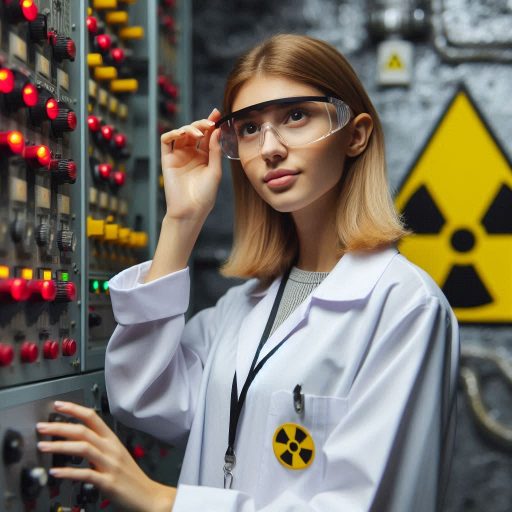Introduction
Nuclear scientists play a crucial role in advancing technology and promoting energy efficiency.
The demand for professionals in this field is steadily increasing as nuclear energy becomes a key player in the global energy landscape.
In order to excel as a nuclear scientist, one must meet specific educational requirements that are essential for success in this competitive field.
Academic Background
Prospective nuclear scientists typically begin their educational journey by obtaining a bachelor’s degree in a related field such as physics, chemistry, engineering, or nuclear science.
This foundational knowledge provides a solid grounding in the principles and concepts that underpin nuclear science.
Specialized Training
Graduate studies are usually required to pursue a career as a nuclear scientist.
A master’s degree or Ph.D. in nuclear engineering, nuclear physics, or a similar discipline is often necessary to develop expertise in nuclear technology and research.
Hands-On Experience
Hands-on experience through internships or research projects is invaluable for aspiring nuclear scientists.
Practical training in nuclear laboratories helps students hone their skills and gain real-world experience in nuclear research and development.
Continuing Education
Continuing education is essential for nuclear scientists to stay current with advancements in the field.
Attending conferences, workshops, and seminars enables professionals to network with peers and experts while keeping abreast of new developments in nuclear science.
Certifications and Licenses
Obtaining certifications and licenses, such as the Professional Engineer (PE) license or the American Board of Radiology (ABR) certification.
Can enhance credibility and career prospects for nuclear scientists.
These credentials demonstrate competence and commitment to high standards in the field.
Bachelor’s degree in a relevant field
Earning a bachelor’s degree in a relevant field is crucial for aspiring nuclear scientists.
This foundational step opens doors to advanced study and research opportunities.
Students should focus on disciplines such as nuclear engineering, physics, or chemistry.
These fields provide the necessary knowledge and skills for a successful career in nuclear science.
Importance of Earning a Bachelor’s Degree
Nuclear engineering offers insights into the design and operation of nuclear systems.
Students learn about reactor physics, radiation detection, and safety measures.
Courses in thermal hydraulics teach the behavior of fluids under heat transfer.
These subjects equip students with essential technical expertise.
Physics plays a vital role in understanding nuclear reactions and radiation.
A solid grasp of classical mechanics, electromagnetism, and quantum mechanics is essential.
Students should take courses in nuclear physics, which cover nuclear structure and decay processes.
These topics deepen their understanding of atomic interactions and energy release.
Chemistry is another important area of study for nuclear scientists.
Knowledge of chemical reactions and properties helps in understanding nuclear materials.
Courses in inorganic and physical chemistry are particularly beneficial.
They provide insights into the behavior of radioactive elements and their interactions with other substances.
Essential Courses for Aspiring Nuclear Scientists
In addition to core courses, students should pursue laboratory work.
Hands-on experience in a laboratory setting is invaluable.
It allows students to apply theoretical knowledge to real-world scenarios.
Laboratory courses in radiation safety and measurement techniques are crucial for developing practical skills.
Mathematics is also a key component of a nuclear scientist’s education.
Proficiency in calculus and differential equations is essential.
These mathematical tools help scientists analyze complex problems and model nuclear processes.
Students should take courses in statistics as well, as they aid in data interpretation and risk assessment.
Internships and co-op programs provide additional advantages.
These experiences allow students to gain practical insights into the nuclear industry.
They also help students build professional networks and enhance their resumes.
Seeking opportunities at national laboratories or nuclear power plants can be particularly beneficial.
Moreover, aspiring nuclear scientists should stay informed about industry advancements.
Participating in relevant workshops and seminars can foster continuous learning.
Engaging with professional organizations like the American Nuclear Society offers valuable resources and networking opportunities.
In review, obtaining a bachelor’s degree in a relevant field is a critical first step for nuclear scientists.
Essential courses in nuclear engineering, physics, and chemistry lay the groundwork for future success.
Practical experience, internships, and ongoing education further enhance their qualifications.
This strong educational foundation prepares graduates for the dynamic and challenging field of nuclear science.
Read: Challenges and Rewards: The Dual Life of an U.S. Environmental Scientist
Advanced degrees
Benefits of Pursuing a Master’s or Doctoral Degree in Nuclear Science
Pursuing an advanced degree in nuclear science significantly enhances your career prospects.
A master’s or doctoral degree opens doors to specialized knowledge and expertise.
This education provides a deeper understanding of complex nuclear systems and technologies.
It also equips you with the skills needed for innovative research and development.
Specialized Knowledge and Research Opportunities Available at the Graduate Level
Graduate programs in nuclear science focus on advanced topics, such as reactor physics, radiation protection, and nuclear materials.
Students engage in rigorous coursework that challenges their analytical and problem-solving abilities.
They learn to apply theoretical principles to practical scenarios in various nuclear settings.
This advanced education enables students to tackle real-world challenges in the field.
Research opportunities abound at the graduate level.
Students can collaborate with experienced faculty on cutting-edge projects.
They may explore areas such as nuclear energy production, medical applications, or environmental impacts of radiation.
These projects allow students to contribute to significant advancements in nuclear science.
Graduate studies also foster critical thinking and research skills.
Students learn to design experiments, analyze data, and interpret results.
This experience is invaluable, as it prepares them for roles in academia, industry, or government.
The ability to conduct independent research sets graduates apart in the job market.
Competitive Advantage of Holding an Advanced Degree in the Field
Holding an advanced degree provides a competitive advantage.
Employers often prioritize candidates with advanced education and specialized training.
These individuals bring a higher level of expertise to their roles, making them more desirable.
They can handle complex problems and drive innovation within their organizations.
In many cases, advanced degrees lead to higher salaries and better job positions.
Graduates with master’s or doctoral degrees often secure leadership roles in research and development.
They may also become experts in regulatory compliance or safety analysis.
These positions carry significant responsibilities and offer substantial rewards.
Moreover, advanced degrees enhance professional networks.
Graduate programs connect students with industry leaders and fellow researchers.
These relationships can lead to collaboration, mentorship, and job opportunities.
Networking is crucial in the nuclear science field, where connections often influence career advancement.
Finally, pursuing an advanced degree in nuclear science reflects a commitment to lifelong learning.
The field continually evolves, and advanced education ensures you stay current with new developments.
This dedication positions you as a leader in the industry, capable of addressing emerging challenges.
In short, advanced degrees in nuclear science provide essential benefits.
They deepen knowledge, offer valuable research opportunities, and enhance career prospects.
Graduates with advanced degrees gain a competitive edge, making them valuable assets in the nuclear science field.
Read: Job Market Trends: Future of Chemistry Jobs in America
Internships and work experience
Internships and work experience play a vital role in the education of aspiring nuclear scientists.
They provide essential practical knowledge that complements academic learning.
Many universities emphasize the importance of gaining hands-on experience during studies.
Through internships, students can apply theoretical concepts in real-world settings, making their education more relevant and impactful.
The Value of Gaining Practical Experience Through Internships or Research Positions
Practical experience is crucial for success in nuclear science.
Internships and research positions allow students to immerse themselves in the industry.
These experiences enhance their understanding of complex scientific concepts.
They also provide opportunities to engage with current technologies and methodologies.
Interns learn how to navigate challenges and contribute to real-world projects.
This hands-on experience greatly boosts confidence and expertise.
Examples of Reputable Organizations or Government Agencies Where Aspiring Nuclear Scientists Can Gain Hands-On Experience
Reputable organizations and government agencies offer excellent internship opportunities.
The U.S. Department of Energy (DOE) provides various internships focused on nuclear science and engineering.
Participants work on projects related to energy, safety, and waste management.
The Nuclear Regulatory Commission (NRC) also offers internships for students interested in regulatory processes.
These positions give interns insight into how nuclear policies shape the industry.
Private companies, such as Westinghouse Electric Company and Areva, also provide valuable internship programs.
These companies work on innovative nuclear technologies and safety solutions.
Interns at these firms gain experience in design, operation, and research, enhancing their technical skills.
Such organizations often have strong mentorship programs, allowing interns to learn from industry experts.
How Internships Can Help Individuals Develop Crucial Skills and Network Within the Industry
Internships help individuals develop crucial skills needed in the nuclear science field.
Students learn problem-solving, critical thinking, and teamwork through hands-on projects.
They gain experience using specialized tools and technologies, enhancing their technical competencies.
Furthermore, internships often require interns to present their work, honing their communication skills.
Networking is another significant advantage of internships.
Interns have the opportunity to connect with professionals in the nuclear field.
These connections can lead to mentorship opportunities and job recommendations after graduation.
Building a professional network early in one’s career is invaluable.
Networking can open doors to job offers and collaborations later on.
Additionally, many internship programs offer workshops and training sessions.
These experiences expose interns to current industry trends and challenges.
Participants gain a deeper understanding of the nuclear sector, preparing them for future roles.
Most importantly, internships and work experience are essential for aspiring nuclear scientists.
They provide practical skills, foster professional connections, and enhance employability.
By taking advantage of these opportunities, students can gain a competitive edge in the nuclear science field.
Engaging with reputable organizations and government agencies can significantly shape their careers, ensuring they are well-prepared for the challenges ahead.
Read: Challenges and Rewards: Navigating the Chemist Career Path

Professional Certifications
The Importance of Obtaining Professional Certifications in Nuclear Science
Obtaining professional certifications in nuclear science is crucial for advancing one‘s career.
These credentials demonstrate expertise and commitment to the field.
They enhance job prospects by setting candidates apart in a competitive job market.
Employers often seek certified professionals who have proven their knowledge and skills.
Transform Your Career Today
Unlock a personalized career strategy that drives real results. Get tailored advice and a roadmap designed just for you.
Start NowSpecific Certifications That Are Recognized in the Field and Can Enhance Job Prospects
Several certifications are widely recognized in the nuclear science field.
The American Nuclear Society (ANS) offers certifications in nuclear engineering and radiation protection.
The National Registry of Radiation Protection Technologists (NRRPT) provides certification for radiation protection technicians.
The Certified Health Physicist (CHP) credential signifies expertise in radiation safety and health physics.
Each of these certifications enhances a scientist’s credibility and career opportunities.
The Process of Obtaining and Maintaining Certifications for Nuclear Scientists
To obtain these certifications, candidates typically need to meet specific educational and experience requirements.
For example, ANS certification often requires a degree in nuclear engineering and relevant work experience.
Candidates must also pass a rigorous examination to demonstrate their proficiency in nuclear science principles.
Preparing for these exams can take significant time and effort, but it is a valuable investment.
Maintaining professional certifications requires ongoing education and adherence to industry standards.
Most certifying organizations mandate continuing education credits to ensure professionals stay current with technological advancements and regulatory changes.
This commitment to lifelong learning reflects the dynamic nature of nuclear science.
Some organizations offer resources to help certified professionals track their continuing education credits.
For instance, the ANS provides an online portal for managing professional development.
Staying engaged in workshops, seminars, and conferences is also essential.
These activities allow nuclear scientists to network and learn from peers.
In addition to enhancing job prospects, certifications can lead to higher salaries.
Employers recognize the value of certified professionals, often offering increased compensation to attract them.
This financial incentive makes pursuing certifications a wise choice for many nuclear scientists.
In essence, professional certifications play a vital role in the careers of nuclear scientists.
They validate expertise, improve job prospects, and offer opportunities for career advancement.
With several respected certifications available, professionals can choose the path that aligns with their career goals.
Dedicating time to obtain and maintain these credentials demonstrates a commitment to excellence in the field of nuclear science.
Read: Diverse Career Paths: From Chemist to Patent Attorney in the US
Continuing education and skill development
In the rapidly evolving field of nuclear science, continuing education plays a vital role.
Nuclear scientists must stay current with advancements in technology and research.
This commitment to lifelong learning enhances their expertise and ensures they remain competitive in their careers.
The Importance of Staying Current with Advancements in Nuclear Science Through Continuing Education
Continuing education is essential for nuclear scientists to keep pace with the industry’s dynamic landscape.
New technologies and research findings emerge frequently, making it crucial for professionals to stay informed.
Ongoing learning helps scientists understand new safety protocols and regulatory changes.
As the field evolves, their expertise must adapt to maintain relevance and effectiveness.
The Various Opportunities for Nuclear Scientists to Enhance Their Skills and Knowledge
Nuclear scientists have various opportunities to enhance their skills and knowledge.
One of the most effective methods is through formal education programs.
Many universities offer specialized courses and certifications in nuclear science and related disciplines.
These programs often cover new technologies and current research trends.
Conferences and workshops provide valuable learning experiences as well.
These events allow scientists to engage with experts, share ideas, and learn about the latest research.
Networking at these events can lead to collaborations that enrich their professional lives.
Additionally, online courses have gained popularity, providing flexible options for busy professionals.
Scientists can learn at their own pace and choose topics relevant to their interests and needs.
Professional organizations, such as the American Nuclear Society (ANS), offer resources for ongoing education.
These organizations frequently host webinars, training sessions, and seminars that cover current trends in nuclear science.
Membership in such organizations can open doors to various educational resources and networking opportunities.
The Role of Professional Development in Advancing Career Opportunities in the Field
Skill development is equally crucial in this field.
Nuclear scientists can enhance their technical skills through hands-on training.
Laboratories and research facilities often provide opportunities for scientists to experiment with new equipment and technologies.
Participating in research projects can deepen their understanding of practical applications.
Furthermore, interdisciplinary collaboration can broaden a scientist’s knowledge base.
Working with experts from other fields, such as engineering or environmental science, can introduce innovative approaches to problem-solving.
This exchange of ideas fosters creativity and enhances the scientist’s skill set.
Professional development plays a significant role in advancing career opportunities.
Employers often seek candidates with a commitment to continuous learning.
Those who engage in ongoing education demonstrate their dedication to the field and their readiness for new challenges.
Moreover, obtaining advanced degrees or certifications can lead to leadership positions.
Employers recognize the value of professionals who stay informed about industry trends and best practices.
Such qualifications can also result in higher salaries and increased job security.
Basically, continuing education and skill development are essential for nuclear scientists.
By pursuing formal education, participating in workshops, and engaging in professional organizations, they can stay current.
Ultimately, this commitment to growth opens doors to new career opportunities and advancements in their field.
Uncover the Details: How to Choose a Neuroscience Research Topic
Research and publications
The significance of conducting research and publishing findings in the field of nuclear science
Research and publications play a crucial role in the field of nuclear science.
They enhance scientific knowledge and help shape advancements in technology and safety.
Engaging in research allows nuclear scientists to explore complex problems and develop innovative solutions.
Furthermore, publishing findings helps disseminate valuable information to the broader scientific community.
How research experience can contribute to career advancement and credibility
Conducting research significantly contributes to career advancement and credibility.
It demonstrates expertise and commitment to the field.
Employers value candidates with a solid research background.
Publications establish a scientist‘s reputation and showcase their ability to produce impactful work.
Furthermore, they create networking opportunities with other professionals, leading to collaborations and new projects.
Tips for aspiring nuclear scientists on how to get involved in research projects and publish their work
For aspiring nuclear scientists, getting involved in research projects is essential.
Start by seeking out internships or volunteer opportunities at universities or research institutions.
These experiences provide practical skills and knowledge.
Networking with professors and industry professionals can also open doors to research projects.
Attend conferences and workshops to connect with established scientists in the field.
In addition, joining student organizations related to nuclear science can be beneficial.
These groups often provide access to research initiatives and mentorship opportunities.
Participate in collaborative projects to gain experience and contribute to meaningful research.
Engaging in discussions with peers can also spark new research ideas.
Publishing research can seem daunting, but it is a vital step in a scientist‘s career.
Start by selecting a specific topic of interest and conducting thorough research.
Write a clear and concise manuscript that presents your findings.
Focus on contributing new insights to the field and ensure your work is original.
Choose the right journal for publication.
Consider the scope and audience of the journal.
Follow submission guidelines carefully to improve the chances of acceptance.
Collaborate with experienced researchers or mentors who can provide guidance and feedback on your work.
Finally, be persistent in pursuing publication.
Rejection is common, but it should not discourage you.
Use feedback to improve your manuscript and resubmit.
Each publication strengthens your resume and enhances your credibility.
In fact, engaging in research and publishing findings are vital for success in nuclear science.
They enhance knowledge, boost careers, and establish credibility.
Aspiring nuclear scientists should actively seek research opportunities and pursue publication to make a meaningful impact in the field.
Conclusion
Pursuing a career as a nuclear scientist demands a solid educational foundation.
Individuals typically need a bachelor’s degree in nuclear engineering, physics, or a related field.
Many nuclear scientists further their education with a master’s or doctorate to enhance their expertise.
Advanced degrees offer deeper knowledge and research opportunities, making candidates more competitive in the job market.
In addition to formal education, aspiring nuclear scientists should acquire practical experience.
Internships and co-op programs provide hands-on training and valuable industry insights.
These experiences help students apply theoretical knowledge in real-world settings, reinforcing their learning and skills.
Continuous education is also vital in this rapidly evolving field.
Nuclear science encompasses various technologies and regulatory standards, which regularly change.
Professionals must stay updated on the latest advancements to maintain their effectiveness and relevance.
Workshops, conferences, and certification programs offer excellent opportunities for skill enhancement.
Investing in education and skill development is crucial for success in nuclear science.
A strong academic background lays the groundwork for a fulfilling career.
It equips individuals with the necessary technical knowledge to navigate complex challenges in the field.
Moreover, skill development fosters critical thinking and problem-solving abilities, essential for addressing nuclear-related issues.
[E-Books for Sale]
The Big Book of 500 High-Paying Jobs in America: Unlock Your Earning Potential
$19.99 • 500 High-Paying Jobs • 330 pages
Explore 500 high-paying jobs in America and learn how to boost your career, earn more, and achieve success!
See All 500 High-Paying Jobs of this E-Book
1001 Professions Without a Degree: High-Paying American Jobs You Can Start Now
$19.99 • 1001 Professions Without a Degree • 174 pages
Discover 1001 high-paying jobs without a degree! Unlock career tips, skills, and success strategies for just $19.99!




